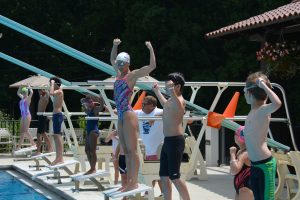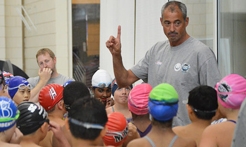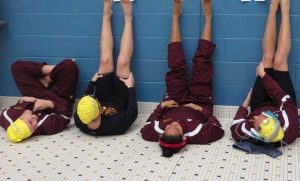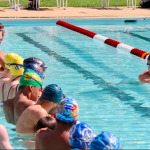1. Productive, successful people commit themselves to the cultivating their time management.

For swimmers who balance the rigors of school with the requirements for swimming – the struggle is tough… even for Olympians.
“There will definitely come a time when you’re going to feel like there aren’t enough hours in the day to get everything done that you want,” says two-time Olympian Connor Jaeger, who majored in mechanical engineering while swimming at the University of Michigan.
So then how do you get your homework done on time while making every practice (and every interval)? For advice, we turned to Jaeger and another athlete who’s been on both sides of the teacher’s desk: 3-time Olympian and Cal Berkeley grad Matt Biondi, who’s now a high school math instructor and swim coach in Los Angeles. “Sports and academics go exceptionally well together,” says Biondi. “It’s when you introduce a regular routine of short-term gratification (texting, TV, skipping practice for to hang out) that it all falls apart.”
Angeles. “Sports and academics go exceptionally well together,” says Biondi. “It’s when you introduce a regular routine of short-term gratification (texting, TV, skipping practice for to hang out) that it all falls apart.”
2. Don’t shortchange yourself when it comes to shuteye.
If you do, you’re going to come up short at the pool and school, Jaeger cautions. “You’re also going to be much less productive on your work when you’re tired. I know that in high school, I would work for as long as I could, but always cut myself off before it got too late.”
3. Ration your homework time. “If you only have two hours and three classes’ worth of homework to do, you probably don’t want to spend more than 45 minutes or an hour on any one class,” Biondi reasons.

4. Spend your Saturdays and Sundays wisely. “Use the weekend to really getting ahead on the work for the coming week,” Jaeger advises.
5. Keep an eye on the calendar. “It’s important that you not put off big projects and that you come up with a plan,” Biondi warns. “At the school where I teach, we come up with concrete deadlines for the kids to train them during middle school, then in high school, we tend to turn them loose and trust that they’ve learned those skills. But a lot of kids haven’t.” Jaeger adds: “Your studying is going to be a lot less stressful if you start soon and space it out. That way you can actually study a lot without it feeling overwhelming.”
6. Got academic trouble? Keep your coach in the loop. “I’ve had a couple of swimmers who’ve come to me and said, ‘I’m getting a C in this class and I have to miss practice on Mondays because that’s the only day the tutor can see me.’ I’m totally supportive of that. What I’d tell that swimmer is, ‘Let’s make a schedule and if you need to miss Monday practices, I understand. Other than that, I expect you at practice.’ What doesn’t work is when they tell me, ‘I’m struggling in this class so I’m going to need to miss practice when I feel like it.’ That opens up a Pandora’s box.”
7. Cut yourself a break once in a while. “I think this is where a lot of kids fall short,” Biondi observes. “They end up so anxious about all of the expectations that they end up diminishing their potential. Do the best you can. If that’s all you’ve got and you’re tired but you only did half your math homework, so be it. Then see if you can squeeze it in the next day before class.” (Just don’t make a habit of it.)

8. Make deals with yourself to get through the day. “If I felt sick or at the end of my rope, I would make these little deals with myself,” says Biondi. “I would tell myself, ‘Go to practice. Go in a good mood. Pick one set where you’re give it your all.’ And that got me to practice, it got me in a good mood and, lo and behold, before I knew it, I was training my butt off on every set.”
But avoid devil’s bargains, he warns. “It’s when you turn on the TV or pick up your phone because you don’t feel good or you tell yourself, ‘I don’t need to do my homework because we have a substitute tomorrow, that’s a slippery slope.”
9. Don’t shy away from demanding college majors. “Time demands should not decide whether you become an engineer, a doctor, or anything else for that matter,” says Jaeger. “If you want to do it, then you should do it. You are on campus to be a student-athlete, not just a student and not just an athlete.”
10. Use the resources available to you. “I can’t speak for every college,” Jaeger notes, “but I know that at the University of Michigan, we always had professors that were understanding of our travel schedule and willing to work with us on our assignments or exams that we would have to take on the road. We also had great access to campus computing sites, engineering software, and tutors that the athletic department paid for. You will be given all the resources (and more) that you need to be successful in the classroom.”
11. Finally, be honest with yourself. Biondi recalls that, “One thing I did growing up was to take a moment when I was brushing my teeth and ask myself, ‘Did I really do everything I could today?’ And inevitably, I could see where I cut corners. But if you feel good about what you’ve done at the end of each day, it gives you a great sense of confidence when it comes time to perform, either in the pool or in the classroom.”







